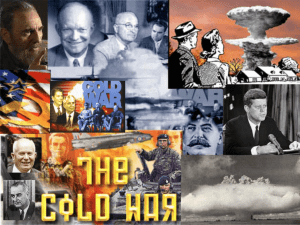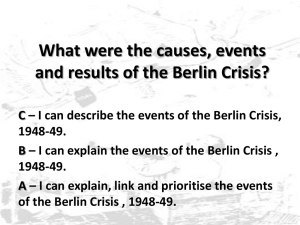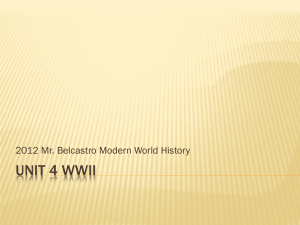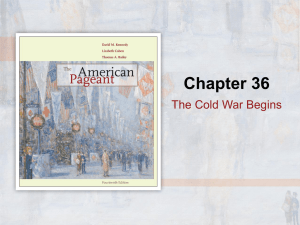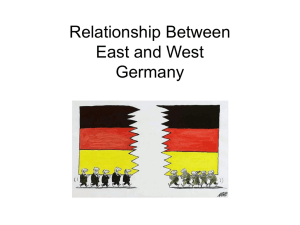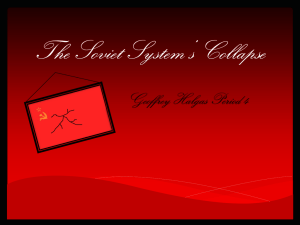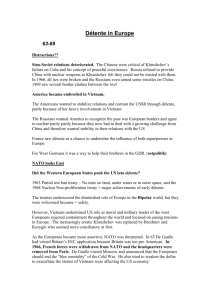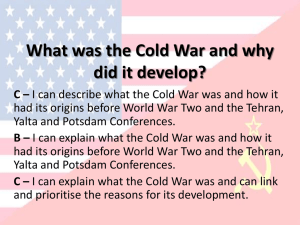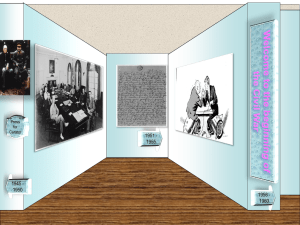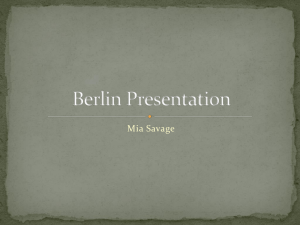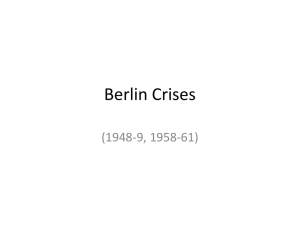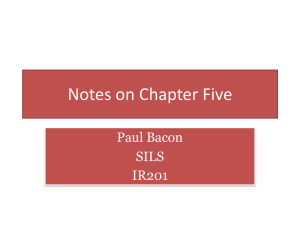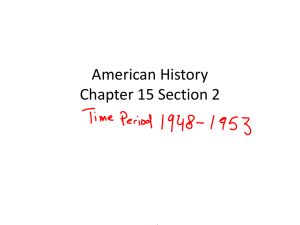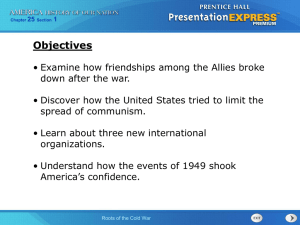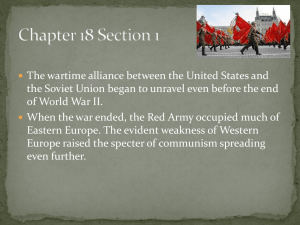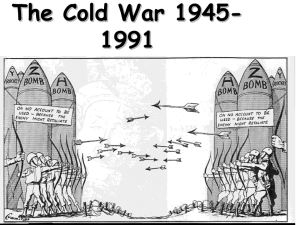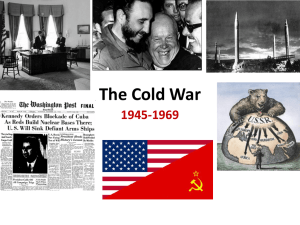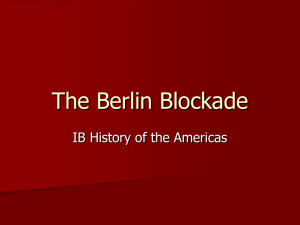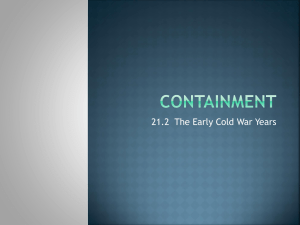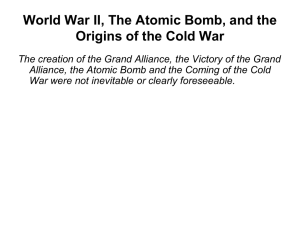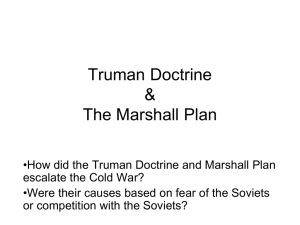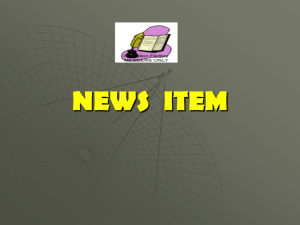Cold War Booklet (GRT)
advertisement
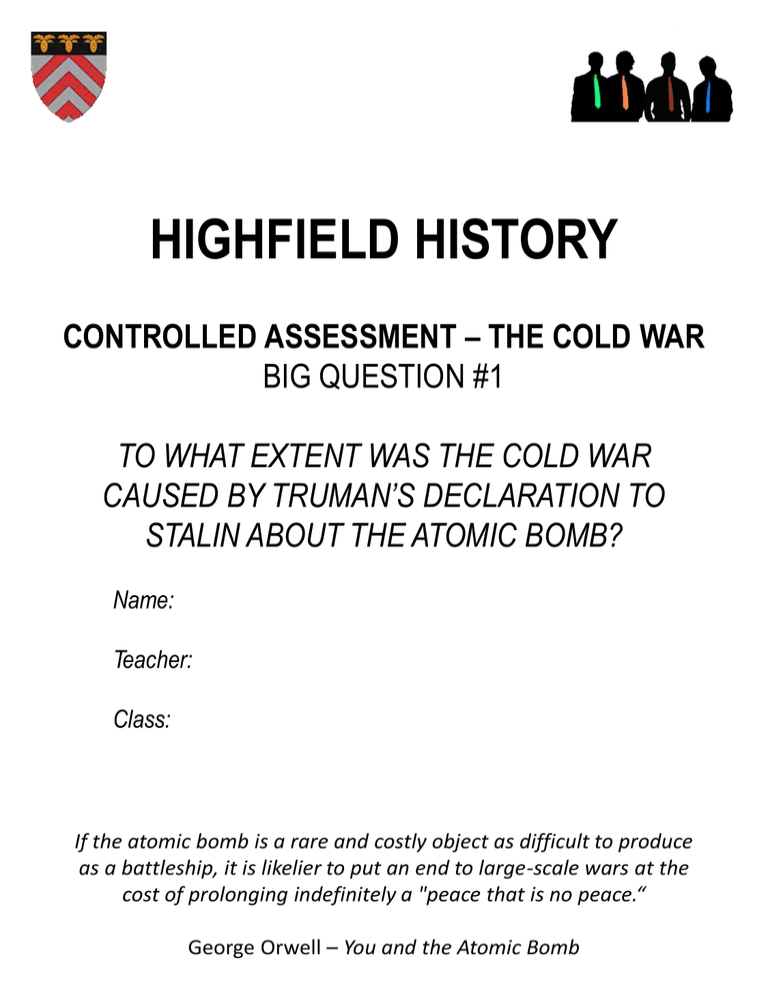
HIGHFIELD HISTORY CONTROLLED ASSESSMENT – THE COLD WAR BIG QUESTION #1 TO WHAT EXTENT WAS THE COLD WAR CAUSED BY TRUMAN’S DECLARATION TO STALIN ABOUT THE ATOMIC BOMB? Name: Teacher: Class: If the atomic bomb is a rare and costly object as difficult to produce as a battleship, it is likelier to put an end to large-scale wars at the cost of prolonging indefinitely a "peace that is no peace.“ George Orwell – You and the Atomic Bomb CONTROLLED ASSESSMENT – THE COLD WAR BIG QUESTION 1 TO WHAT EXTENT WAS THE COLD WAR CAUSED BY TRUMAN’S DECLARATION TO STALIN ABOUT THE ATOMIC BOMB? Lesson Title Knowledge Objective Skill Objective Learning Outcome From World War to Cold War Describe the global situation at the end of WW2 Extract relevant details from a picture source Understand where and how the Cold War began. Explain why the USA and USSR were no longer allies The Potsdam Conference Explain why relations deteriorated at Potsdam Extract relevant details from a text source Describe what happened at Yalta Compare Yalta to Potsdam The “Iron Curtain” Judge whether the Soviets “liberated” Eastern Europe Use details from a source to support a statement Understand what the Iron Curtain was Recognise why different views were held about the Soviet “liberation” of Eastern Europe Dollar Imperialism Compare the roles of Truman and Marshall Summarise an historical interpretation. Understand how tension turned to Cold War Know what the Truman Doctrine and Marshall Aid were How effective was the USA’s response to the Berlin Blockade? Compare the actions of the USA and USSR in Berlin Compare historical interpretations Explain why there was a Berlin Blockade Describe the division of Germany The Cold War - A clash of ideologies or the fault of an individual? Judge who or what was to blame for the Cold War Evaluate Cold War sources Explain why NATO was set up Mini Assessment Create two historical arguments Support a statement with appropriate evidence Produce a mini essay in the style of a controlled assessment Homework Picture Source Question Read extract from book and answer questions Write up / Type up essay answer based upon planning produced in the lesson GLOSSARY From World War to Cold War Evening Standard July 1945 Describe the global situation at the end of WW2 Extract relevant details from a picture source Ideologies – What are the differences between Capitalism and Communism? The Potsdam Conference We argued freely and frankly across the table. But at the end of every point unanimous agreement was reached ... We know, of course, that it was Hitler’s hope and the German war lords’ hope that we would not agree – that some slight crack might appear in this solid wall of allied unity ... But Hitler has failed. Never before have the major allies been more closely united – not only in their war aims but also in the peace aims. Extract from President Roosevelt’s report to the USA on the Yalta Conference I have always worked for friendship with Russia, but like you, I feel deep anxiety because of this misinterpretation of the Yalta decisions. Extract from a telegram sent by Prime Minister Churchill to President Roosevelt in May 1945 Explain why relations deteriorated at Potsdam Extract relevant details from a text source YALTA POTSDAM The “Iron Curtain” What was the “Iron Curtain”? Judge whether the Soviets “liberated” Eastern Europe Use details from a source to support a statement ‘The Soviet Union has lost in men several times more than Britain and the United States together. It may be that some quarters are trying to push into oblivion these sacrifices of the Soviet people which insured the liberation of Europe. But the Soviet Union cannot forget them. One can ask therefore, what can be surprising in the fact that the Soviet Union, in a desire to ensure its security for the future, tries to achieve that these countries should have governments whose relations to the Soviet Union are loyal? The growth of the influence of communism cannot be considered accidental. The influence of the Communists grew because during the hard years of the mastery of fascism in Europe, Communists slowed themselves to be reliable, daring and self-sacrificing fighters against fascist regimes for the liberty of peoples. Stalin’s reply to Chuchill’s speech, from an interview with Pravda, March 1946. ‘The Russians wanted to spread communism to Eastern Europe, not liberate it.’ How far does the source above agree with the statement? My view: Did Stalin liberate Europe? ‘From Stettin in the Baltic to Trieste in the Adriatic an iron curtain has descended across the Continent. Behind that line lie all the capitals of the ancient states of Central and Eastern Europe. Warsaw, Berlin, Prague, Vienna, Budapest, Belgrade, Bucharest and Sofia, all these famous cities and the populations around them lie in what I must call the Soviet sphere, and all are subject in one form or another, not only to Soviet influence but to a very high and, in some cases, increasing measure of control from Moscow. The Communist parties, which were very small in all these Eastern States of Europe, have been raised to pre-eminence and power far beyond their numbers and are seeking everywhere to obtain totalitarian control. Police governments are prevailing in nearly every case, and so far, except in Czechoslovakia, there is no true democracy… this is certainly not the Liberated Europe we fought to build up. Nor is it one which contains the essentials of permanent peace.’ Winston Churchill, speaking in the USA, in the presence of President Truman, March 1946 What is the message of the cartoon? This cartoon of 1 October 1947 by EH Shepard for the British magazine Punch shows Marshall (on the left) telling 'Uncle Sam' - i.e. the American nation - that American Aid is needed to shore up the countries of western Europe: 'Come on Sam! It's up to us again.' This Russian cartoon from 1947 shows Uncle Sam on the left and on the right are Greek communists. This cartoon of 18 June 1947 by EH Shepard for the British magazine Punch shows Truman and Stalin as two taxi-drivers trying to get customers. The 'customers' are labelled 'Turkey', Hungary', 'Bulgaria', 'Austria’ Dollar Imperialism Truman Doctrine, 1947 What was it and what did it do? Marshall Plan, 1947 What was it and what did it do? Why was it brought in? Why was it brought in? Stalin Anger Rating: /10 Stalin Anger Rating: /10 Compare the roles of Truman and Marshall Summarise an historical interpretation. John Lewis Gaddis: How reliable is he as a Cold War historian? He is an American historian. He has lived in America all his life and lectures at Yale university. He was born in 1941 and lived through and experienced the Cold War. He places a strong emphasis on using primary sources and used Soviet and American government documents when researching his book. Gaddis is a popular writer writing for the mass market- his books are written in a way to make them bestsellers. Gaddis’s View on the Marshall Plan and Truman Doctrine (From The Cold War, 2005) “The ruling gang of American imperialists has taken the path of open expansion, of enslaving weakened capitalist countries. It has hatched new war plans against the Soviet Union. Imitating Hitler, the new aggressors are using blackmail.” GM Malenkov, a Soviet politician, speaking in 1947 about the Marshall Plan. Andrei Zhdanov echoed this opinion How effective was the USA’s response to the Berlin Blockade? Berlin Blockade In 1945, the Allies decided to split Germany into four zones of occupation. The capital, Berlin, was also split into four zones. The USSR took huge reparations from its zone in eastern Germany, but Britain, France and America tried to improve conditions in their zones. In June 1948, Britain, France and America united their zones into a new country, West Germany. On 23 June 1948, they introduced a new currency, which they said would help trade. Stalin was angered by the creation of West Germany. He could do nothing about it, but could stamp his authority on Berlin which was deep in the Soviet zone. The next day, Stalin cut off all rail and road links to west Berlin - the Berlin Blockade. The west saw this as an attempt to starve Berlin into surrender, so they decided to supply west Berlin by air. The Berlin Blockade lasted 318 days. During this time, 275,000 planes transported 1.5 million tons of supplies and a plane landed every three minutes at Berlin's Templehof airport. On 12 May 1949, Stalin abandoned the blockade. Compare the actions of the USA and USSR in Berlin Compare historical interpretations The Cold War - A clash of ideologies or the fault of an individual? Judge who or what was to blame for the Cold War Evaluate Cold War sources HOMEWORK # 1 DUE DATE TASK – you are to have an in depth look at this cartoon., annotate it (label it with your ideas). These should be in the form of: what you can see, what you think it means and whether or not you think this source is useful in helping you to learn more about the Cold War. Additional Task – Explain whether you think a cartoon or an extract from a speech might be more useful to us as historians? TEACHER FEEDBACK HOMEWORK # 2 DUE DATE TASK – Read extract from book and answer questions Willy Brandt, A Peace Policy for Europe (1968) The North Atlantic Treaty Organisation is first and foremost an effective defence alliance. It prevents potential opponents from being tempted to exert political pressure on any one of the allies through military force. But constant effort is required to maintain this defensive strength in the face of constantly advancing technical development. We realise that the commitment in Europe is a great burden on the United States.... I am afraid that the time for any significant lightening of the United States' burden has not yet come. NATO and a policy of détente are not mutually exclusive. On the contrary, the existence of NATO - that is, its political weight and its readiness to defend our territory against all attacks – has shown that a policy of tensions and crises is of no avail. The weakening of NATO would reduce the possibility of a détente and lessen its effectiveness. The military deterrent has ensured the peace of Europe.... Military security and détente do not contradict, but supplement each other. Without the firm support of the alliance we cannot carry on any policy of détente. Similarly the political objective of the alliance will not be realised without an EastWest détente. Task and Questions Read through Willy Brandt’s writing and highlight all the things that you think he says are good about NATO in one colour and all the limitations of NATO in another. GOOD LIMITATIONS Find out what Détente means and define it here: Which countries were members of NATO? In your opinion, was NATO going to help improve relations between the USA and USSR, or make it worse? Explain your answer. TEACHER FEEDBACK The Space Race – BBC Docudrama Episode 1 - Race For Rockets (1944-1949) We see the results of Wernher von Braun's work on the V-2 for the Nazis at Mittelwerk and Peenemünde, and his final activities within Germany during the last years of the Second World War, as both American and Soviet forces race to capture German rocket technology. When the Americans gain the upper hand by recovering von Braun and most of his senior staff, along with all their technical documents and much other materiel, we see Sergei Korolev's release from the Gulag to act as the Soviets' rocketry expert alongside former colleague Valentin Glushko, and how he is set to work bringing Soviet rocket technology up to date with that of von Braun, working with what material and personnel are left after von Braun's escape to the US. The American development of rockets Explain how significant the early stages of the Space Race were The Soviet (Russian) development of rockets By the end of the 1940s, who was winning this “Space Race?” The Cold War – Spies 1944 -1994 Cold War 21/24 full length documentary - Spies 1944-1994 As you watch this documentary make notes about how serious the issues with spying were from both sides CIA – The Central Intelligence Agency KGB – Soviet Russian secret police Stasi – The East German Secret Police How serious was spying taken between 1944 and 1960s? Describe the role of spies on both sides during the Cold War How serious was spying taken between 1960s and 1990s? Was there a time when spying was at its most dangerous? Which side was more paranoid about spying and why?
